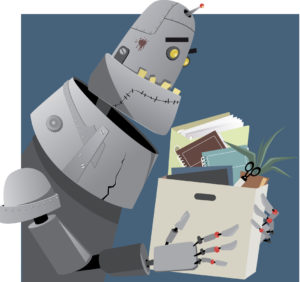 We don’t hear it very often, but humans have been known to take robots’ jobs. Despite the chuckles these incidents created, it brings to mind some larger questions that technologists have been asking. What are the limitations that robots have? How best to use them so they can work alongside human being as opposed to taking jobs away?
We don’t hear it very often, but humans have been known to take robots’ jobs. Despite the chuckles these incidents created, it brings to mind some larger questions that technologists have been asking. What are the limitations that robots have? How best to use them so they can work alongside human being as opposed to taking jobs away?
In the meantime, here’s what happened.
The South China Morning Post reported the Japan-based Henn-na Hotel chain is doing away with dinosaur and humanoid robots that manned its front desks, along with other robots that worked in the hotels. It’s bringing in humans in their place.
Henn-na was largely staffed by robots, but they proved unable to answer all of guests’ questions and robot luggage carriers couldn’t reach all rooms, among other problems, according to the story. The Wall Street Journal also reported one in-room robot mistook a guest’s snoring as a request and kept waking the guest up to repeat the request.
While these robots didn’t pan out, the South China Morning Post said the hotel still plans a new generation of robot workers. The plan is that they be smarter and more able to do certain tasks. There’s no doubt that AI will impact our workforce but what does it mean for us.
CEO and futurist Byron Reese looks into the question in his book, The Fourth Age: Smart Robots, Conscious Computers and the Future of Humanity. One point he makes: Technology increases human productivity, and that’s a good thing. He also notes AI today is mainly about automation. Still a long way off is the AI of science fiction where computers possess the same abilities as the human mind, only at a much more powerful level, and can do everything people can. That’s known as artificial general intelligence, and the jury is out over whether it’s even possible to build such a thing.
An interview with Reese and his thoughts on AI and jobs will appear in the upcoming issue of Staffing Industry Review magazine. In addition, he will be a keynote speaker at the 2019 Staffing Industry Executive Forum in Austin, Texas.
Chatbots are an example of AI that is impacting the industry. They allow candidates to know where they stand in the job process once they have applied. Being informed and not in a black box is helping both the candidate and the industry’s reputation. This is just the beginning of a process that is going us to the next level.
As Reese says in his Staffing Industry Review interview: “I think the most likely outcome is that automation and robots and AI will increase productivity just like other technologies have but increase it dramatically which will raise the standard of living of everyone.”








